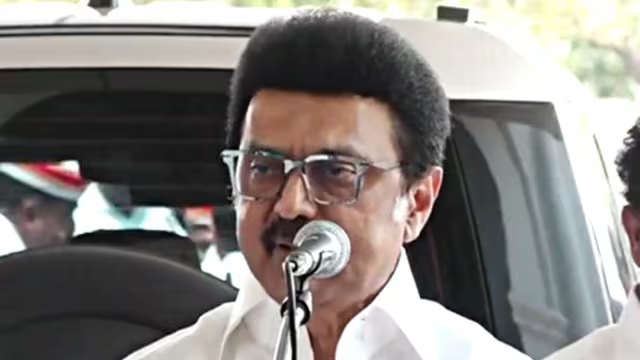Tamil Nadu Chief Minister and DMK president MK Stalin addressed his party workers and urged them to to spread the message on how the delimitation exercise would directly impact the state’s self respect, social justice, and welfare schemes for the people. (@mkstalin/X)
In a powerful rebuke to the Indian government’s proposed delimitation exercise, Tamil Nadu’s Chief Minister M K Stalin has sent a strong message to New Delhi: the state will not accept a process that he believes would unfairly disadvantage southern states. The crux of Stalin’s argument is that redrawing parliamentary constituencies solely based on population would penalise states like Tamil Nadu, which have successfully controlled population growth through proactive measures.
“Our demand is clear — don’t determine parliamentary constituencies based on population alone. Do not penalise the Southern states that took responsible measures to control population growth,” Stalin said in a video statement earlier this week, issuing a stark warning that Tamil Nadu and his party, the Dravida Munnetra Kazhagam (DMK), would resist any such changes.
The proposed delimitation, a constitutionally mandated redrawing of electoral boundaries following each national Census, has ignited fierce political debate. While the exercise is designed to ensure equitable representation across India’s states, southern states like Tamil Nadu have long feared that delimitation based solely on population would shift political power to the more populous northern regions.
Stalin’s defiance comes at a moment of heightened political tension between the DMK and the Bharatiya Janata Party (BJP)-led central government. He described the proposed delimitation as an “injustice” and vowed that neither his party nor the state would accept a process that undermines Tamil Nadu’s interests. “Tamil Nadu will resist, and we will win,” he added, urging his supporters to pledge their commitment to defending the state’s future.
A battle on multiple fronts
The resistance to delimitation is intertwined with another contentious issue in Tamil Nadu: language. “The battle for language is our lifeline, and the fight against delimitation is our right,” Stalin reminded his supporters. He linked both issues, asserting that the delimitation process would not only reduce Tamil Nadu’s political influence but also threaten its social justice framework and the welfare schemes that have long benefited the state’s population.
Stalin’s message also took aim at the broader impact of delimitation on other southern states like Karnataka and Telangana, as well as Punjab in the north. He claimed that voices of Opposition were growing louder in these regions, with leaders from across party lines expressing solidarity. “The central government insists they will not impose their will on the states, but their actions suggest otherwise,” he said, accusing New Delhi of pushing an agenda that favours northern states where the BJP has a strong voter base.
Stalin’s criticism isn’t just aimed at the political and cultural consequences of delimitation. He warned that it could impact the allocation of federal funds, exacerbating existing economic imbalances between India’s northern and southern states. Tamil Nadu has already faced financial repercussions due to its refusal to adopt a three-language policy that includes Hindi, Stalin noted, and the delimitation process threatens to compound those injustices. “They claim they will not reduce Tamil Nadu’s parliamentary seats, but they refuse to assure us that the representation of other states will not be disproportionately increased,” he said.
Delimitation: A Sword Over Southern States
Stalin’s remarks come ahead of an all-party meeting in Tamil Nadu, which he has called for March 5 to discuss the implications of delimitation. He described the looming threat as a “sword hanging over southern states,” warning that Tamil Nadu could lose seats in the national legislature because of its successful family planning policies.
Delimitation has been a recurring flashpoint. The exercise is supposed to occur after every decennial Census to realign the number of seats in the Lok Sabha (the lower house of India’s Parliament) and state assemblies to reflect changes in population. However, the number of parliamentary seats has remained frozen since 1976, when then-Prime Minister Indira Gandhi imposed a moratorium to prevent a sudden shift in political power towards the populous northern states. The moratorium was initially extended to 2001 and later to 2026, with the intention of protecting the political representation of states that had managed to stabilize their population growth.
National ramifications
The debate over delimitation has already surfaced in national political discourse. Prime Minister Narendra Modi, while campaigning in the 2023 Telangana Assembly elections, invoked the issue to criticize the opposition Congress party. Modi warned that under Congress’s vision of “jitni aabadi, utna haq” (rights in proportion to population), southern states would lose out significantly in parliamentary representation. “The southern states have achieved remarkable progress in population control but will stand to lose heavily if this idea is implemented,” he had said, suggesting that the Congress’s approach could cost southern India as many as 100 Lok Sabha seats.
The BJP, with its power base in the populous northern states, stands to gain politically from a population-based delimitation process. Critics argue that this would entrench the party’s dominance in national politics at the expense of the South.
Union Home Minister Amit Shah had responded to Stalin’s recent comments by promising that the delimitation exercise would not result in “injustice” to the southern states. However, Opposition leaders remain sceptical, fearing that the redistribution of political power could fundamentally reshape India’s electoral landscape.
What is delimitation?
Delimitation is a Constitutional mandate, to be carried out after every Census, to readjust the number of seats and their boundaries on the basis of the latest population data. But the number of seats for the Lok Sabha and state Assemblies has remained frozen since 1976.
